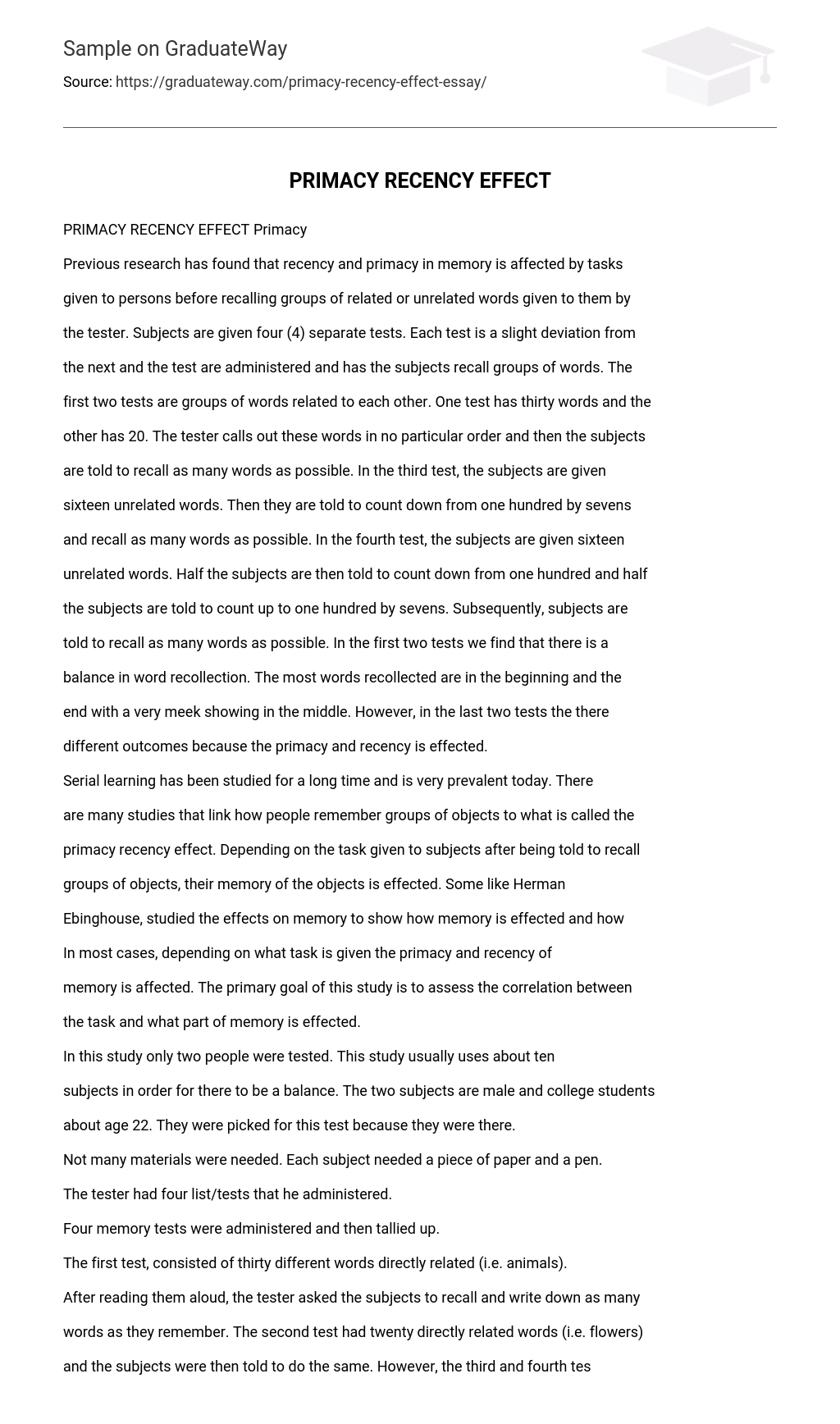Previous research has found that recency and primacy in memory are affected by tasks given to persons before recalling groups of related or unrelated words given to them by the tester. Subjects are given four (4) separate tests. Each test is a slight deviation from the next and the test are administered and has the subjects recall groups of words. The first two tests are groups of words related to each other. One test has thirty words and the other has 20. The tester calls out these words in no particular order and then the subjects are told to recall as many words as possible.
In the third test, the subjects are given sixteen unrelated words. Then they are told to count down from one hundred by sevens and recall as many words as possible. In the fourth test, the subjects are given sixteen unrelated words. Half the subjects are then told to count down from one hundred and half the subjects are told to count up to one hundred by sevens. Subsequently, subjects are told to recall as many words as possible.
In the first two tests we find that there is a balance in word recollection. The most words recollected are in the beginning and the end with a very meek showing in the middle. However, in the last two tests the three different outcomes because the primacy and recency is effected. Serial learning has been studied for a long time and is very prevalent today.
There are many studies that link how people remember groups of objects to what is called the primacy recency effect. Depending on the task given to subjects after being told to recall groups of objects, their memory of the objects is effected. Some like Herman Ebinghouse, studied the effects on memory to show how memory is affected and how In most cases, depending on what task is given the primacy and recency in memory is affected.
The primary goal of this study is to assess the correlation between the task and what part of memory is affected. In this study only two people were tested. This study usually uses about ten subjects in order for there to be a balance. The two subjects are male and college students age 22. They were picked for this test because they were there. Not many materials were needed. Each subject needed a piece of paper and a pen. The tester had four lists/tests that he administered. Four memory tests were administered and then tallied up. The first test, consisted of thirty different words directly related (i.e. animals).
After reading them aloud, the tester asked the subjects to recall and write down as many words as they remember. The second test had twenty directly related words (i.e. flowers) and the subjects were then told to do the same. However, the third and fourth tests were slightly different. The third test consisted of sixteen unrelated words. After these words were called out the tester then told the subjects to count one hundred backwards by sevens and then go ahead and remember as many words as possible.
Finally, the fourth test was given. It consisted again, of sixteen unrelated words and the subjects were split into two groups. One group had to count up to one hundred by sevens and the other group had to count down from one hundred by sevens. In the first two tests, subjects recalled more of the first and last words heard. Recollection of the words in the middle of the lists was much less. In the third test subjects lost sight of the last words of the list when asked to count down from one hundred by sevens. This is called thee Primacy effect. More of the first five words were recalled and the other eleven words were recalled less.
In the fourth test, the results did not come out the way it was supposed to (not enough subjects). Because half the subjects are counting up and half the subjects are counting down both the primacy and recency memory should be effected. However, in this test more of the first words were recalled and the other eleven were scarcely recalled. The results indicated that memory (primacy and recency) is affected by the task given to subjects before asked to recollect a group of words.
The first test is given to assess the pattern at which the subjects recollect groups of words. It shows us that the pattern is like a pyramid. First and last words are easier to recall. However, the last tests are given to assess what counting up or down from one hundred by sevens does the subjects’ memory. The study shows that those subjects counting up had a difficulty recalling the first words and those subjects counting backwards have difficulty recalling the last words called out by the tester.





